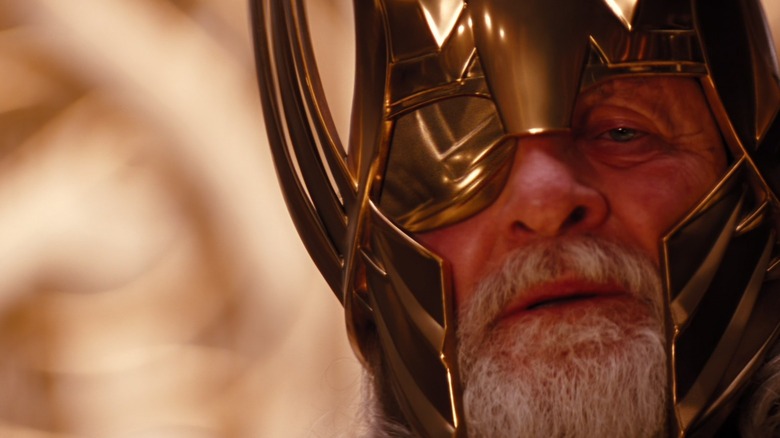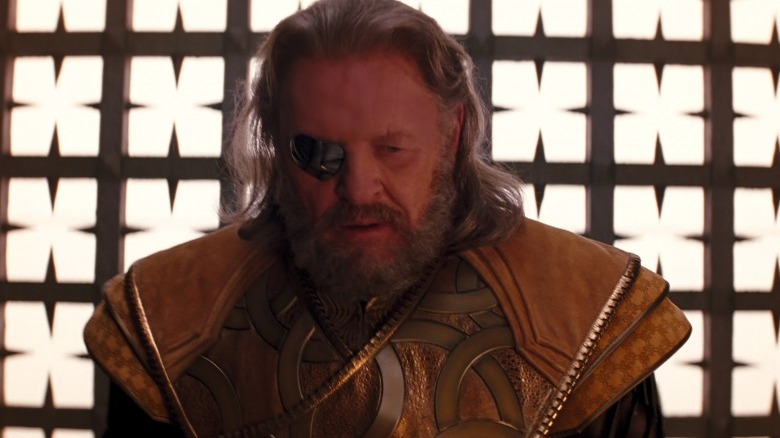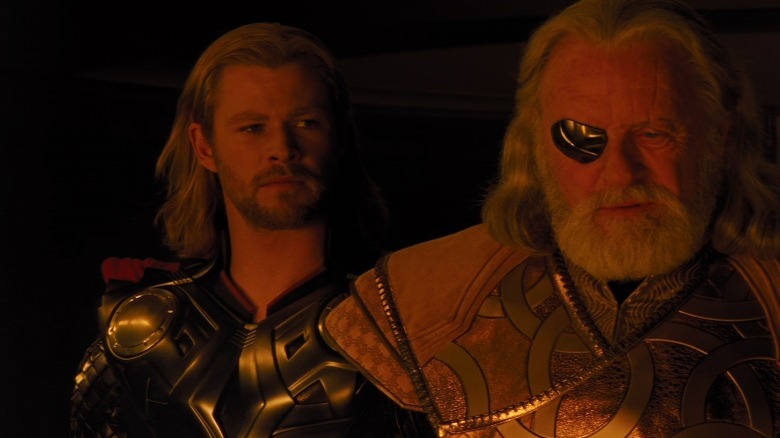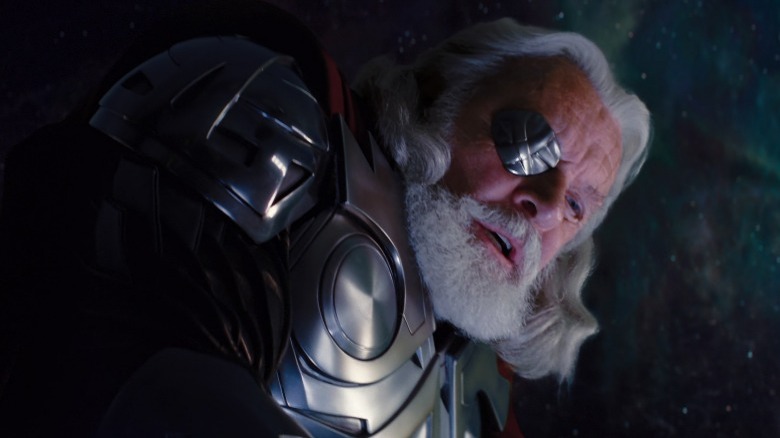Why Anthony Hopkins Found His Role As The MCU's Odin 'Pointless'
It's not exactly uncommon for great actors to look back at some of their most well-known roles and express apathy or even contempt for them. Alec Guinness famously cared little for his work in "Star Wars," even to the point of making monumental demands for his appearance in the sequel. With "Game of Thrones" having an extensive cast of storied actors, Liam Cunningham was one of the few to look at the experience with affection, and even he didn't exactly jump at the chance to do the show. In some ways, fantastical franchise work can be especially hard on such actors, even if the pay is very good.
Anthony Hopkins is one such actor, one of the prime examples of a performer who always brings elegance, dignity, and nuance to every character he plays. Whether it was his breakout, Oscar-winning role in Jonathan Demme's 1991 film "The Silence of the Lambs," his shattering work in 1993's "Remains of the Day," or even his bizarre and hilarious showing in 2017's "Transformers: The Last Knight," you see those qualities.
In 2011, he appeared in another sci-fi franchise, playing the kind of supporting role that becomes the bread and butter for classically trained British actors of a certain age: the old, wise leader, tasked with making decisions that will guide a kingdom. This was "Thor," the first film in the Marvel Cinematic Universe sub-series about the titular God of Thunder (Chris Hemsworth). Hopkins would show up in that, the 2013 sequel "Thor: The Dark World," and the 2017 sequel "Thor: Ragnarok."
Despite the many returns, he had mixed feelings about the part. As he told The New Yorker in 2021, "It's pointless acting."
Superheroes by way of Shakespeare
When it came to the "Thor" series, the characters were treated with utmost seriousness, at least at first. The first movie in 2011 told the story of the god's fall from grace and ousting from the kingdom of Asgard, as well as his eventual redemption in victory over his brother Loki (Tom Hiddleston). All of which set the stage for the first "Avengers" film in 2012. To the extent that Odin (Anthony Hopkins) factors into the narrative, he is essentially a plot device, somebody to withhold Thor's destiny until he proves himself.
It's by no means the meatiest role of Hopkins's career up to that point. Nor does it meaningfully utilize his talents beyond the refined theatricality he could pull off with little effort. This was an actor who had started doing William Shakespeare plays at the Royal National Theatre in 1965, playing a broadly Shakespearean king in a superhero movie in 2011. Piece of cake.
Shakespeare was clearly who Marvel had in mind when it came to developing "Thor," particularly in the hiring of frequent Bard adapter Kenneth Branagh to direct. At this point in the Marvel story, Thor had yet to make the shift into comedy that would come to define him (for better and, as Chris Hemsworth admits, for worse). Branagh takes the story fairly seriously, from the opening battle with the Frost Giants to the lighter fish-out-of-water material that comprises most of the movie.
Most of the Asgardian cast of the movie, with the exception of Thor and Loki, are left fairly one-dimensional by the movie's end, mostly functioning as types. And Hopkins, with stentorian grace and distinguished manners, would have to struggle to make Odin interesting with so little on the page.
No acting required
If it sounds a bit harsh for Anthony Hopkins to call the work he did in the "Thor" movies "pointless acting," it's worth remembering that this is an older actor with a history of beloved performances and accolades in fantastical franchise mode. He was 73 years old when the movie was released, and as he told MTV News, "It's a surprise to be in these sorts of movies." For him, working on the movie was fairly easy, with his familiarity with Shakespearean decorum letting him easily sit back and watch young actors like Tom Hiddleston and Chris Hemsworth take the material a bit more seriously.
There are occasional exceptions, like Bill Nighy's enthusiasm and energy for all things Pokémon in 2019's "Detective Pikachu," but the general vibe from many older actors around doing franchise work tends to begin and end with it being a paycheck gig. That classification feels especially true of Odin in "Thor," who mostly plays the role of a disappointed dad before his surprisingly tender seaside passing in "Thor: Ragnarok."
For Hopkins, aging into a mode where he could more easily summon the details he needed for a performance made acting more enjoyable, but less of an obsession, as he told The Talks in 2011. That ease probably added to the seeming "pointlessness" he described to The New Yorker, which wasn't helped either by the nature of acting against a green screen. The distancing effect of visual effects-heavy film sets can go far.
The Marvel Method
It's not as if Anthony Hopkins took the money from Marvel and ran, never to give a serious or moving performance again — he won the Oscar for Best Actor in "The Father" in 2021. But with the Marvel movies, he made a fairly conscious choice to show up and say his lines. As he told The New Yorker, he wrote "N.A.R." on his copy of the "Thor” script, a phrase that hearkens back to Gregory Peck's own script notes for John Huston's "Moby Dick:" No Acting Required. And Peck was playing Captain Ahab, a role with a bit more depth than Odin, Thor's dad.
At a time when the question of the Marvel movies' artistic credibility is constantly up for debate, when directors like Quentin Tarantino implicitly cite it when calling the present "one of the worst eras in film history," it's worth noting that many actors to work in the franchise have had more engaging experiences than Hopkins. Angela Bassett's work in "Black Panther: Wakanda Forever" was a remarkable and highly personal expression of grief. Robert Downey, Jr.'s comeback is directly tied to his frequent work as Tony Stark on from 2008's "Iron Man."
One of the most surprising stars to come out of the Marvel Cinematic Universe is probably Dave Bautista, playing Drax the Destroyer in the "Guardians of the Galaxy" movies. It's difficult to imagine him breaking free so immediately from his wrestling image and developing his trademark blend of sincerity, silliness, and intensity without that role in the series' first entry in 2014. Still, as much as he liked playing Drax, he doesn't want it to be his legacy. That discomfort is probably something Hopkins understands.



